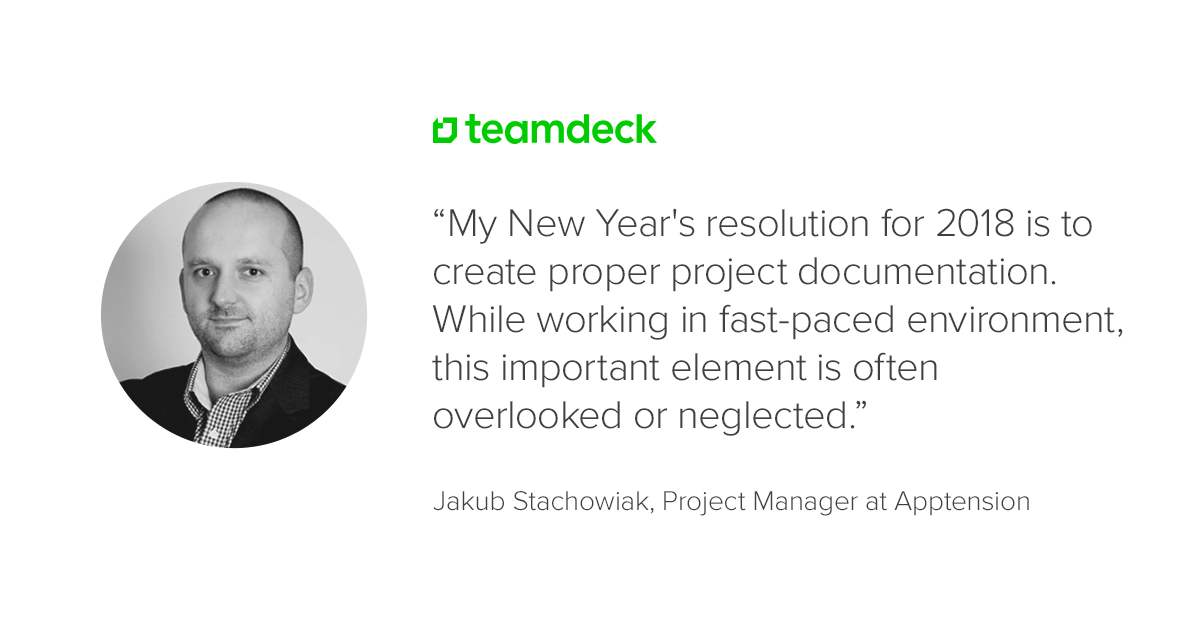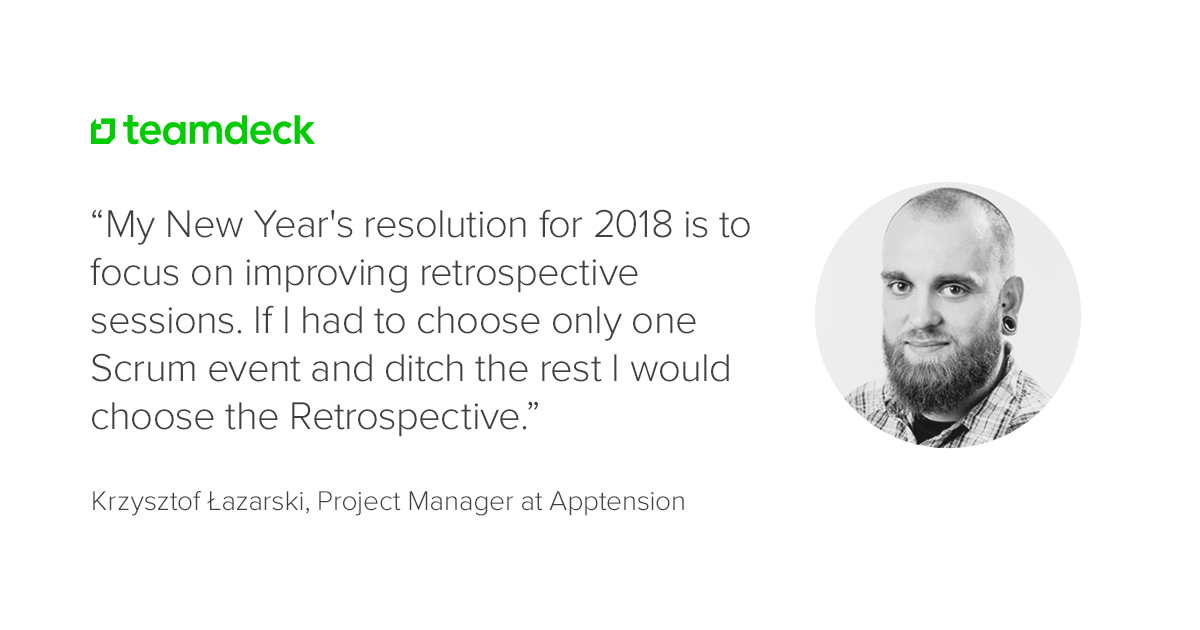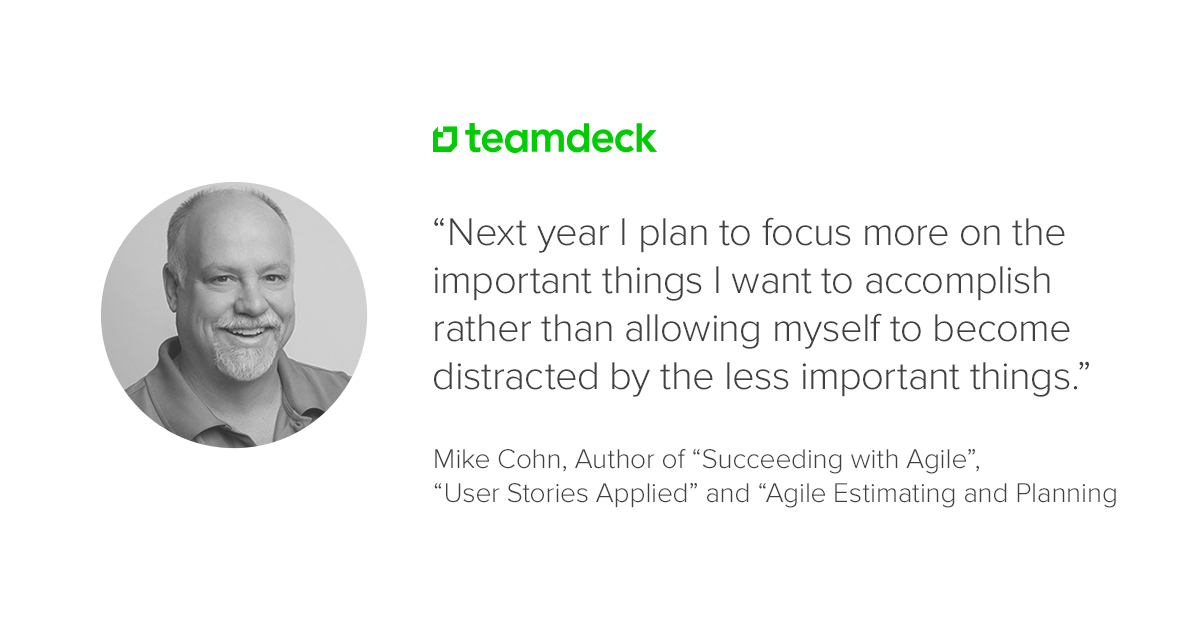Con l'avvicinarsi della fine dell'anno, è naturale iniziare a fare propositi per il nuovo anno. È probabile che anche voi stiate cercando di fare piani e fissare obiettivi per i prossimi due mesi.
E la vostra carriera di project manager? C'è qualcosa che vorreste fare l'anno prossimo per ottenere di più o per migliorare le vostre prestazioni?
Diversi PM hanno accettato di condividere con noi i loro propositi.
- Affrontare i problemi - Aleksandra Leończyk, Product Manager di teamdeck
- Migliorare la documentazione - Jakub Stachowiak, responsabile di progetto presso Apptension
- Focus sulla leadership - Ben Aston, Fondatore di The Digital Project Manager
- Migliorare le sessioni retrospettive - Shehryar Riaz, Produttore di UNIT9 e Krzysztof Łazarski, Project Manager di Apptension
- Dare priorità ai propri compiti - Mike Cohn, autore di "Riuscire con Agile", "Storie utente applicate" e "Stima e pianificazione Agile".
- Prevedere le esigenze del progetto - Shannon Kennedy, produttore di Jam3
1. Alleviare i rischi e i problemi prima che si concretizzino
In qualità di project manager, molto spesso vi capita di essere portatori di cattive notizie, sia per il vostro team che per i vostri clienti. Può essere sicuramente spiacevole, quindi è naturale cercare di evitare situazioni come queste.
"L'evitamento può talvolta essere una strategia vincente; tuttavia, la maggior parte delle volte è molto più efficace affrontare tempestivamente le situazioni potenzialmente problematiche, prima che diventino minacce o ostacoli reali". - Aleksandra Leończyk, teamdeck Product Manager, sottolinea con precisione. "Nel 2018 vorrei concentrarmi sull'essere più proattivo e cercare di ridurre i rischi e i problemi prima che si concretizzino".

Quindi, come si può migliorare la propria capacità di risolvere i problemi? Ecco il suo punto di vista sulla questione:
"Voglio combattere attivamente queste tentazioni e promuovere la mia attitudine a risolvere i problemi, oltre a incoraggiare i miei team a discutere apertamente con me delle loro preoccupazioni e a offrire suggerimenti.
Dopo tutto, analizzare i rischi, comunicarli in modo tempestivo e costruttivo, eliminare gli impedimenti e accettare i cambiamenti sono la chiave del successo di qualsiasi progetto o impresa.
Riassumendo, la mia ambizione quest'anno è quella di riconoscere e affrontare eventuali rischi e problemi il prima possibile".
2. Creare una documentazione adeguata
Si può amare o odiare, ma fornire una documentazione di progetto accurata è un must per i project manager. "Lavorando in un ambiente frenetico, questo importante elemento viene spesso trascurato o trascurato". - Jakub Stachowiak, Project Manager di Applicazione. "Intendo raccogliere un elenco di buone pratiche sia per quanto riguarda il contenuto dei documenti di progetto che la loro organizzazione".

Il problema è: come descrivere una documentazione "adeguata"? Trovare una via di mezzo tra ciò che è necessario, ciò che è utile e ciò che può essere aggiornato.
"Una buona documentazione (che non significa certo "estesa") può facilitare il lavoro degli sviluppatori, migliorare la comunicazione con il cliente e certamente avvicinarci al successo del progetto" - aggiunge Jakub Stachowiak.
3. Focus sulla leadership
Ben Aston, fondatore di Il responsabile di progetto digitalesottolinea l'importanza della leadership strategica: "Nel 2018 mi concentrerò sui modi in cui posso guidare meglio me stesso, il mio team e i miei progetti".
Come dice lui stesso: "Questo inizia con una chiara comprensione del successo, al di là dei costi, delle scadenze e dell'ambito di un progetto, pensando più alla gestione del portafoglio progetti e a come raggiungere gli obiettivi strategici dei nostri progetti e dimostrare il ROI.
Come PM possiamo essere troppo concentrati sulla consegna a scapito della strategia che sta alla base del nostro lavoro. Comprendendo meglio il successo, possiamo ispirare, motivare e guidare il team con una chiara visione unificante. - possiamo aiutare il vostro team a prendere possesso di una visione e a capire perché dovrebbero interessarsi e come possono assumersi la responsabilità di essere coinvolti in modo significativo".

Ecco come Ben vuole raggiungere il suo obiettivo fin da subito:
Nulla motiva come il successo, quindi cercherò di dare un po' di slancio ai miei progetti e di trovare piccole vittorie da festeggiare". - fa sempre miracoli per motivare la squadra, alzare il morale e spingere tutti a dare il meglio di sé".
4. Pianificare e migliorare le sessioni retrospettive
Per Shehryar Riaz, produttore di UNIT9La pianificazione delle Sprint Retrospective è l'aspetto su cui vuole essere più diligente nel 2018.
"I progetti a cui ho lavorato con un buon processo di retrospettiva e pianificazione hanno generalmente portato a migliori abitudini di lavoro e a team complessivamente più felici. È estremamente importante ricevere e condividere il feedback reciproco". - dice Shehryar.

"Non solo le persone si sentono più coinvolte, perché possono contribuire alla gestione del progetto, ma questo porta anche a un lavoro più efficiente e di qualità superiore. Imparare dalle iterazioni passate è fondamentale per pianificare quella successiva".
L'importanza della Sprint Retrospective è sottolineata anche da Krzysztof Łazarski, Project Manager di Applicazione: "Per me è una delle riunioni più importanti durante lo sprint. Se dovessi scegliere un solo evento Scrum e abbandonare gli altri, sceglierei la Retrospettiva.

Dare e ricevere feedback sullo sprint appena concluso è la chiave per un team che lavora bene e aiuta a costruire il senso di appartenenza del team e a promuovere l'autogestione".
5. Dare priorità ai propri compiti
Lavorando su molte cose alla volta, compiti che potrebbero non essere critici catturano la nostra attenzione.
Come Mike Cohn, l'autore di "Succeeding with Agile", "User Stories Applied" e "Agile Estimating and Planning": "L'anno prossimo intendo concentrarmi maggiormente sulle cose importanti che voglio realizzare, anziché lasciarmi distrarre dalle cose meno importanti che spesso distraggono la mia attenzione".

Non si tratta di fare di più, ma di fare meglio: "Non mi aspetto che questo mi aiuti a fare di più, ma mi aspetto che mi aiuti a fare di più l'importante lavoro che faccio per me stesso e per i team che servo".
6. Prevedere le esigenze del progetto
"Un'abilità importante che sto cercando di migliorare continuamente come project manager è la capacità di prevedere le esigenze del progetto su tutti gli aspetti di una produzione". - Shannon Kennedy, produttrice di Marmellata3, ci ha detto.
"Che si tratti di cercare di prevedere le esigenze di risorse prima che si presentino o di anticipare le richieste dei clienti, tutti questi aspetti influiscono sulla mia capacità di affrontare in modo efficiente le sfide che si presentano nel corso di un progetto".

Come può essere utile avere una previsione dei requisiti del progetto?
"Essere preparati fin dall'inizio aiuta a identificare le lacune o i problemi che potrebbero emergere durante la produzione e mi permette di entrare nel progetto preparato e con soluzioni pronte da implementare". - spiega Shannon. "Questa è sicuramente un'abilità che sto cercando di definire e affinare, ma è importante".
A voi la parola
Pensate alla vostra carriera di Project Manager. È un momento perfetto per rivalutare ciò che avete realizzato finora e quali sono i vostri obiettivi per i prossimi mesi. Stabilire obiettivi chiari può aiutarvi a ottenere di più o a migliorare il vostro lavoro.
Avete un proposito che volete condividere con noi? Raccontatecelo nei commenti!









